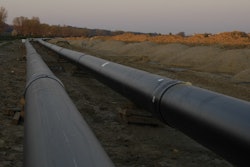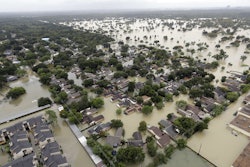TORONTO (AP) — Pipeline company TransCanada said Thursday it's cancelling a plan to build a pipeline that would ship 1.1 million barrels of oil per day from Western Canada to the Atlantic coast in a decision that exposed deep divisions across Canada.
TransCanada Chief Executive Officer Russ Girling said in a statement that "after careful review of changed circumstances," it won't go ahead. Girling had previously called the pipeline a historic opportunity to connect the oil resources of Canada's west to eastern consumers. He'd noted the oil could be shipped to the U.S. Eastern Seaboard, Asia and Europe.
In a letter to the National Energy Board the Calgary, Alberta-based company on Thursday blamed "the existing and likely future delays resulting from the regulatory process, the associated cost implications and the increasingly challenging issues and obstacles" facing the project.
Alberta's oil sands growth has slowed with the decline in the price of oil and there was stiff environmental opposition in the French-speaking province of Quebec.
Supporters said the pipeline was necessary to decrease reliance on the U.S., which takes 97 percent of Canada's energy exports. Alberta has the world's third largest oil reserves, with 170 billion barrels of proven reserves.
The cancellation sparked celebration in Quebec and anger in Western Canada. Montreal Mayor Denis Coderre, who has opposed the pipeline on environmental grounds, said he was thrilled to see it abandoned. Calgary, Alberta Mayor Naheed Nenshi sarcastically said he loved the fact that Montreal's mayor was celebrating the loss of Canadian jobs.
Brad Wall, the premier of the Western Canadian province of Saskatchewan, called the Montreal mayor hypocritical and said he leads a city that just two years ago used a pipeline to dump 2,000 Olympic-sized swimming pools of raw sewage into the St. Lawrence Seaway. Wall also tore into Canadian Prime Minister Justin Trudeau.
"His actions and his government's actions may well have some westerners wondering if this country really values western Canada, the resources we have, and the things we do to contribute to the national economy," Wall said in a statement.
Federal opposition deputy Conservative Lisa Raitt called it a terrible day for Canada and blamed Trudeau for not championing the nation-building project and the nation's energy sector. "Everything Justin Trudeau touches becomes a nightmare," Raitt said.
In Parliament in Ottawa Trudeau called TransCanada's decision a business decision and noted the market has changed from when it was first announced in 2013.
"When they first proposed the Energy East pipeline oil was up around $90 a barrel," Trudeau said. "Since then oil is at around half that price."
TransCanada put its application on hold in September after the National Energy Board said would use a tougher review process that would include looking at indirect emissions related to the pipeline, from production to end use of the oil. The company warned then that it could cancel the proposed 4,500-kilometre (2,800 mile) oil pipeline from Hardisty, Alberta, to Saint John, New Brunswick, which would have been most expensive project in TransCanada's history.
Last year, Trudeau approved one controversial pipeline from the Alberta oil sands to the Pacific Coast, but rejected another. Trudeau approved Kinder Morgan's Trans Mountain pipeline to the Vancouver suburb of Burnaby, British Columbia, but rejected Enbridge's Northern Gateway pipeline to Kitimat, British Columbia. His government has been trying to balance the oil industry's desire to tap new markets with environmentalists' concerns.
TransCanada's Keystone XL pipeline to Texas Gulf Coast refineries awaits some final approvals in the United States.
International oil companies ConocoPhillips and Royal Dutch Shell have sold Canadian oil sands assets this year. The costs to develop the oil sands, a type of unconventional petroleum deposit, are much higher that developing conventional oil deposits.






















